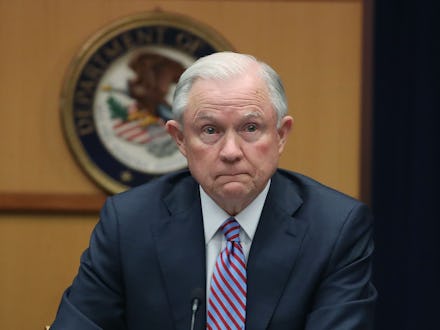Sessions thinks harsher sentencing will stop the opioid epidemic. He's wrong.

On Friday, Attorney General Jeff Sessions released a memo detailing his plans to break with the previous administration and target people who commit low-level drug crimes with the harshest possible charges.
With this latest move, Sessions is making good on his promises to "turn the tide against drugs and addiction again in America" by bringing-back the tough-on-crime approach of past administrations.
Sessions has repeatedly insisted that drug abuse — specifically the ongoing opioid crisis — can be solved with a "law and order" approach.
But his plan overlooks some key points. Harsher sentences don't work to deter crime, research has shown. What's more, health officials say the key to solving the United States' opioid crisis is in treating it as a public health issue, not as a law enforcement issue.
What is Jeff Sessions' drug plan?
Sessions has made it clear that he sees the opioid crisis in the U.S. as an issue that can be solved, in part, by a harsh crackdown on crime.
Speaking in Virginia in March, Sessions told the crowd, "To turn back this rising tide of violent crime, we need to confront the heroin and opioid crisis in our nation — and dismantle the transnational cartels that bring drugs and violence into our neighborhoods."
He reiterated this view yet again during a Thursday speech in West Virginia. Known as the "epicenter" of the country's opioid epidemic, the state sees a resident die of a fatal drug overdose every 10 hours, NBC News reported.
During his speech there, Sessions once again brought up "drug cartels" and "street gangs," saying that "drugs and crime go hand-in-hand."
His Friday memo makes clear that Sessions is already acting on his promises to help solve the country's opioid epidemic through force — but research and expert opinion casts down on his promises that will save lives.
"Cartels" aren't the sole force behind the opioid epidemic
Sessions' focus on "cartels" may be misguided when it comes to the opioid crisis. As NBC News reported on Thursday just before Sessions addressed a crowd in West Virginia, while some opioids are indeed smuggled into the country by cartels, in West Virginia specifically, the opioid epidemic was spurred by doctors over-prescribing opioid painkillers that come from right here in the U.S.
Prescription painkiller abuse isn't just happening in West Virginia, but nationwide. According to the Centers for Disease Control and Prevention, prescription opioids sales in the U.S. nearly quadrupled from 1999 to 2014, despite there being no change in the amount of pain Americans say they're having.
From 2002 to 2013, about three out of four new heroin users said they abused prescription opioids before they began abusing heroin, the CDC reported.
Harsher sentences don't deter crime, studies show
A series of studies published by economists at Columbia and the University of Michigan in 2007 found that the threat of longer prison sentences did not deter crime. And according to the National Institute of Justice, the research arm of Sessions' own DOJ, "increasing the severity of punishment does little to deter crime."
When it comes to drug crimes specifically, a 2015 Pew survey found that harsher federal sentencing laws for drug offenses introduced in the 1980s and 1990s had not led to a reduction in drug use.
The opioid crisis is a health issue, not a crime issue, experts say
As Politico reported in March, many experts say treatment and support do more for people who abuse drugs than jail time and harsh punishments. A 2012 study found that sending people who abuse drugs to treatment programs instead of prison would both save money and provide "positive net societal benefits" to the U.S.
Drug policy expert Leo Beletsky, a law professor at Northeastern University, told Politico the Trump administration's plan to criminalize the nation's drug crisis — combined with plans to cut funding for treatment and research — "will certainly make the situation much worse."
The Trump administration is neglecting the "treatment and prevention" side of the crisis
Sessions has repeatedly reiterated that he sees law-enforcement as merely one part of a three-pronged approach to combating drug addiction. "We must use all three tools that are essential to fighting drug abuse: law enforcement, treatment and prevention," he said on Thursday.
But, as Vice reported on Thursday, Sessions seems to be leaning hard on the "law enforcement" part of that strategy, while "treatment and prevention" fall to the wayside. Trump's proposed budget would cut funding for the agency tasked with fighting the opioid epidemic by 95%. It would also cut the Drug-Free Communities Support Program, which funds programs to prevent substance abuse among young people.
Critics fear that Sessions' new memo indicates that, rather than a new multifaceted approach to fighting opioid addiction in the United States, the new DOJ is planning a return to the same old drug war policies.